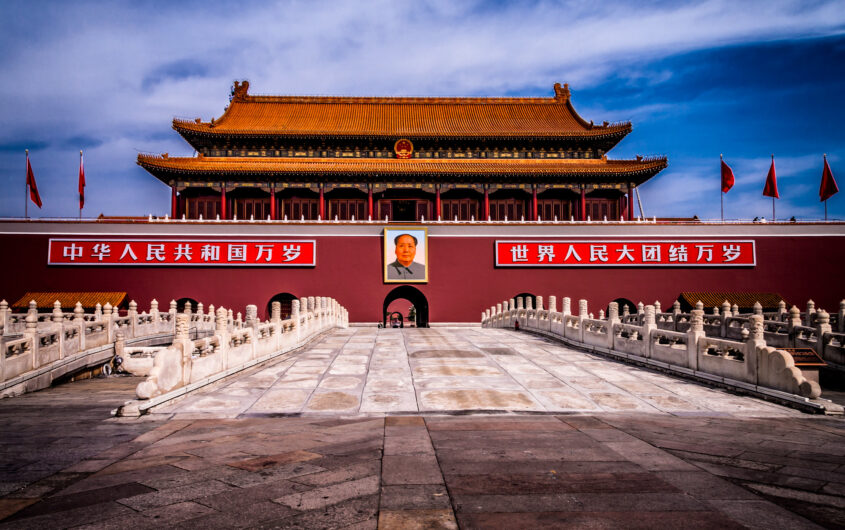
Baron Reznik via Flickr
Small Carrots, Hypothetical Sticks, and Phantom Hopes

Yixiang Xu
China Fellow; Program Officer, Geoeconomics
Yixiang Xu is the China Fellow and Program Officer, Geoeconomics at AGI, leading the Institute’s work on U.S. and German relations with China. He has written extensively on Sino-EU and Sino-German relations, transatlantic cooperation on China policy, Sino-U.S. great power competition, China's Belt-and-Road Initiative and its implications for Germany and the U.S., Chinese engagement in Central and Eastern Europe, foreign investment screening, EU and U.S. strategies for global infrastructure investment, 5G supply chain and infrastructure security, and the future of Artificial Intelligence. His written contributions have been published by institutes including The Chinese Academy of Social Sciences, The United States Institute of Peace, and The Asia Society's Center for U.S.-China Relations. He has spoken on China's role in transatlantic relations at various seminars and international conferences in China, Germany, and the U.S.
Mr. Xu received his MA in International Political Economy from The Josef Korbel School of International Studies at The University of Denver and his BA in Linguistics and Classics from The University of Pittsburgh. He is an alumnus of the Bucerius Summer School on Global Governance, the Global Bridges European-American Young Leaders Conference, and the Brussels Forum's Young Professionals Summit. Mr. Xu also studied in China, Germany, Israel, Italy, and the UK and speaks Mandarin Chinese, German, and Russian.
__
Scholz’s Visit to China Showcases Parallel Practice to Germany’s China Strategy
Nine months after the release of Germany’s first China Strategy, Chancellor Olaf Scholz returned to China at the head of a government and business delegation, to the approval of official Chinese state media. The Global Times succinctly described his visit as “bearing certain resemblances to the Merkel era” and praised the chancellor’s commitment to expanding pragmatic cooperation with China despite “external noises.” China Daily delighted in the importance Scholz assigned to the visit with the presence of three federal ministers and applauded him for understanding that “the only certainty for Germany is cooperation with China.”
The chancellor’s conciliatory tones and eagerness to press Beijing for market access and better conditions for German companies in China differ little from his 2021 pledge to deepen bilateral economic relations upon assuming office. Since that time, a war in Europe and intensifying global strategic competition have compelled the coalition government to view Germany’s relationship with China through a more critical and strategic lens. That lens came in the form of the China Strategy, which emphasizes reducing economic dependencies on China and promoting trade and supply chain diversification. Ideally, according to the document, Germany will take steps to alter its economic relationship with the People’s Republic, “de-risk,” and use its leverage through the European Union’s trade defense instruments, rather than relying on the power of persuasion.
Scholz’s reception in Beijing proved that the Chinese leadership is much more eager to press its agenda than to listen to European grievances. His request to Xi Jinping to pressure Russia to end its war in Ukraine was easily brushed off. Not only did Xi rebuff the chancellor’s appeal to rein in China’s excess manufacturing capacity by lecturing his visiting German guests on the laws of the market economy, but he also shrewdly reminded him of German industries’ reliance on Chinese supply chains as well as China’s advantages in green technologies, electric vehicles, and artificial intelligence.
In the end, there was little achievement to show from the three-day visit, save Beijing’s lift of its import ban on German beef and a promise to buy German apples and pork. Even China’s restatement of its opposition to the use of nuclear weapons seemed to be a subtle downgrade of their joint warning during Scholz’s 2022 visit, which also included the threat of their use.
Xi and his government did not need to offer significant deals or concessions. They are largely comfortable with the state of Sino-German relations. German investment in China rose to a record high in 2023, and a growing share of German corporate earnings is staying in China, shifting jobs and R&D there. China also enjoys a large trade surplus with Germany, its products dominating the country’s supply of consumer electronics. In addition, the German government has not meaningfully “meddled” in cross-strait relations with Taiwan, despite parliamentary delegations to Taipei and a “vile” visit by what Chinese media branded a “rogue” cabinet minister to the island, and has held off Brussels from sanctioning Chinese companies for supporting Russia. Scholz made the visit more pleasant for the Chinese government by not inviting representatives from the Federation of German Industries (BDI), whose 2019 paper kickstarted the debate over recalibrating Germany’s economic relationship with China.
There is, of course, room for improvement from China’s point of view. Beijing would very much like to see Berlin fighting back against Brussels’ anti-subsidy investigations into Chinese electric vehicles, wind turbines, solar panels, and railway companies, or more enthusiastically resisting pressure from Washington to restrict the export of chemicals essential for manufacturing semiconductors to China. What Xi wants is a Germany that is acquiescent to China’s economic statecraft goals.
Xi and his government did not need to offer significant deals or concessions. They are largely comfortable with the state of Sino-German relations.
So, in addition to a few small carrots, Xi’s government deployed the tried-and-true instrument of ensuring Germany’s cooperation, the insinuation of Chinese retaliation. The thought of China targeting German trade and investments, its manner and extent never specified, has been a constant source of nightmare scenarios for the German economy. These hypothetical sticks, rather than careful calculations of engineered economic disentanglement, have served as effective deterrence against radical changes to the status quo for many German politicians and business leaders. The German government’s reluctance to make up its mind about Huawei’s 5G equipment in the country’s critical telecommunications infrastructure, despite neighboring France adopting tight restrictions, is a prime example.
That is not to imply that Scholz’s government has done nothing to de-risk from China. It scaled back investment guarantees in China and blocked more Chinese investments in strategic German industrial assets. Its outspoken Minister of Education and Science Bettina Stark-Watzinger became the first German cabinet minister to visit Taiwan in twenty-six years and published a new position paper for enhancing Germany’s research security.
However, that is not enough to deal with China that is a “competitor” and “systemic rival,” as defined in the coalition government’s China Strategy. The lack of reciprocity for market access and China’s huge government subsidies are not going to end as Beijing doubles down on increasing industrial capacity to drive growth and embraces domestic substitutes for its economic security and plan for technology dominance. Neither will China cease to invoke its economic leverage for its policy goals over Germany’s economic and security concerns. As long as no major efforts are made to alter the reality of Germany’s economic ties with China, through government investments in essential and critical sectors and strategic use of trade defense tools, Berlin can only nurse phantom hopes of getting China to respect its strategic and economic interests.
Scholz’s visit to China is a reminder that despite having a set of very sensible policies enshrined in Germany’s China Strategy, Berlin has not been sufficiently eager to pursue those goals when presented with the unappealing task of facing down Beijing’s vague threat to use its economic leverage to retaliate. For now, one can at least take comfort in knowing that the chancellor’s conciliatory approach to China is not government policy, merely government practice.








